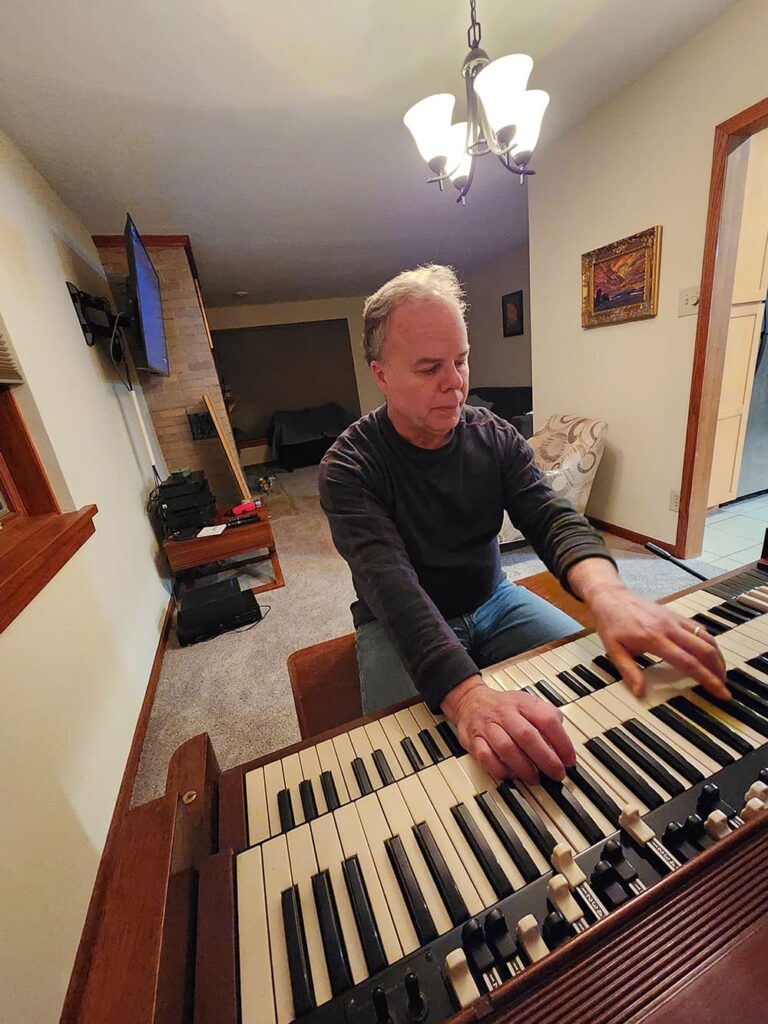
I have to admit that I got to know about the Sorry For Laughing thanks to the wonderful series of reissues started by the Viennese label Klanggalerie. Austrians with great passion search for old, sometimes forgotten bands, the existence of which we may not even know. Sorry For Laughing released their first recordings in 1986, but after a break of several decades, they started recording and releasing new albums. The leader and originator of the project is Gordon H. Whitlow, known from the legendary band. Biota, who invited very interesting artists to his group. An important and integral role in the recordings of Sorry for Laughing are the vocals of Edward Ka-Spel and Martyn Bates, whose voices perfectly harmonize with the compositions of the project. As for the music of Sorry for Laughing, it is quite minimalistic and at the same connected to visual art. It is filled with the richness of sounds of instruments, giving a eteric aura of mystery immersed as if in a dreamy present.
The questions were answered by Gordon H. Whitlow.
Art courtesy of Tom Katsimpalis (Sorry For Laughing)
Michał Majcher
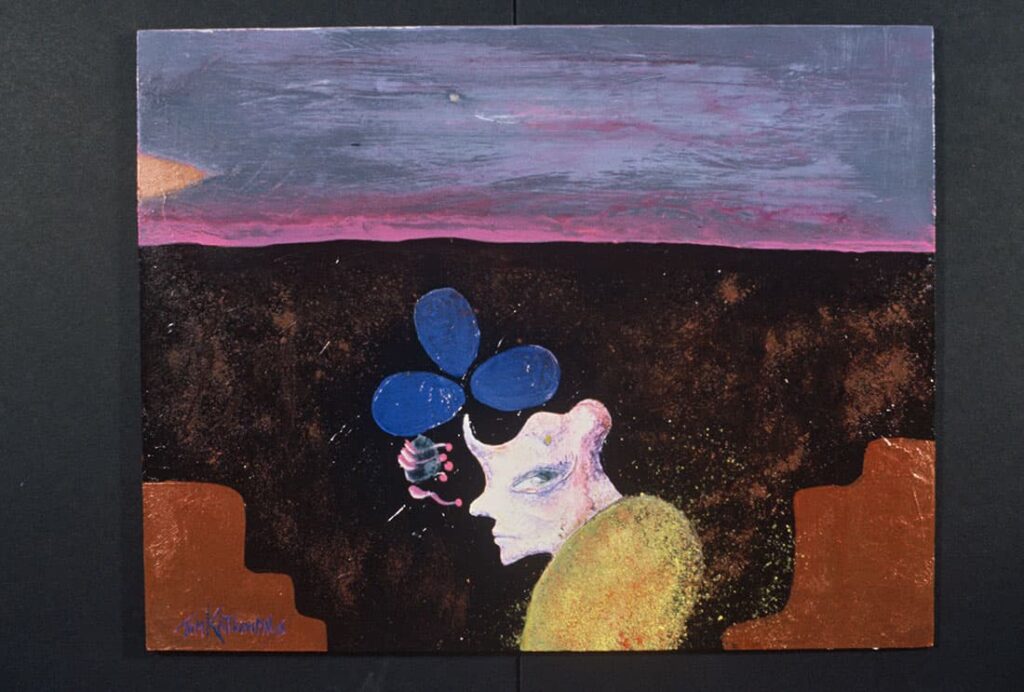
Michał Majcher: When did you start playing and creating, what made you do it?
Gordon: I’ve had musical interests for as long as I can remember, but I guess the urge to create started to show in my teen years. Things really started to come into focus creatively by my mid-20s, around the time I first joined on with Biota. I think that the urge to create and do something new was always the main motivation – that, and the love of music in general.
MM: Do you remember your first musical projects?
G: There were numerous bands and what-not in the early college years, but my first recorded music project came in 1985 with Biota, for the RēR Quarterly, on Chris Cutler’s Recommended Records label (RēR) – the first of numerous Biota recordings and albums on RēR. Playing bass at the time, I co-composed and recorded “Early Rest Home”, still a big personal Biota favorite. It was formative and really opened up the door to further composing. Certainly a lot of fond memories from those first Biota projects.
MM: You are a member of the Biota collective for over a dozen years, how did you get to it?
G: Yes – well over a dozen years! Around the beginning of 1985, a friend and fellow community radio broadcaster at Colorado State University put me in touch with a radio engineer who just so happened to have an active recording outfit in town called Mnemonists (a.k.a., Biota). That engineer was Bill Sharp, who had also worked for a time at the same radio station. At the time, I had a local rock band of my own that I felt good about, and I wanted to ask Bill if he would be interested in hearing for the purpose of possibly producing a record. Before that could happen, though, I was invited to attend a Biota session at the Bughouse studio in Loveland, Colorado – a studio some Biota listeners might know of from liner notes. We immediately connected, and it became clear to me that I would be involved with Biota full-time. The other local rock band fell away, and my first full album with Biota (Bellowing Room) was soon to follow.
MM: In my opinion, Biota’s music is a combination of folk, avant-garde rock, electronics and jazz, but everything is connected with a certain beauty or delicacy of sounds, which makes it distinguishable from others. Will you agree with me?
G: Thank you so much for that astute observation. The balance of various musical forms is what we strive for, to be sure – and more importantly to place it all in a carefully crafted sonic environment that is stimulating. All of us in the group have been touched in our lives as listeners by great works from the genres you mention, and somehow those loves have been distilled in us to emerge in, we hope, our own form. So, I do agree there is a distinguishable result in Biota’s process, one that I think is personal yet informed by the creative camaraderie and esthetic we as group members share.
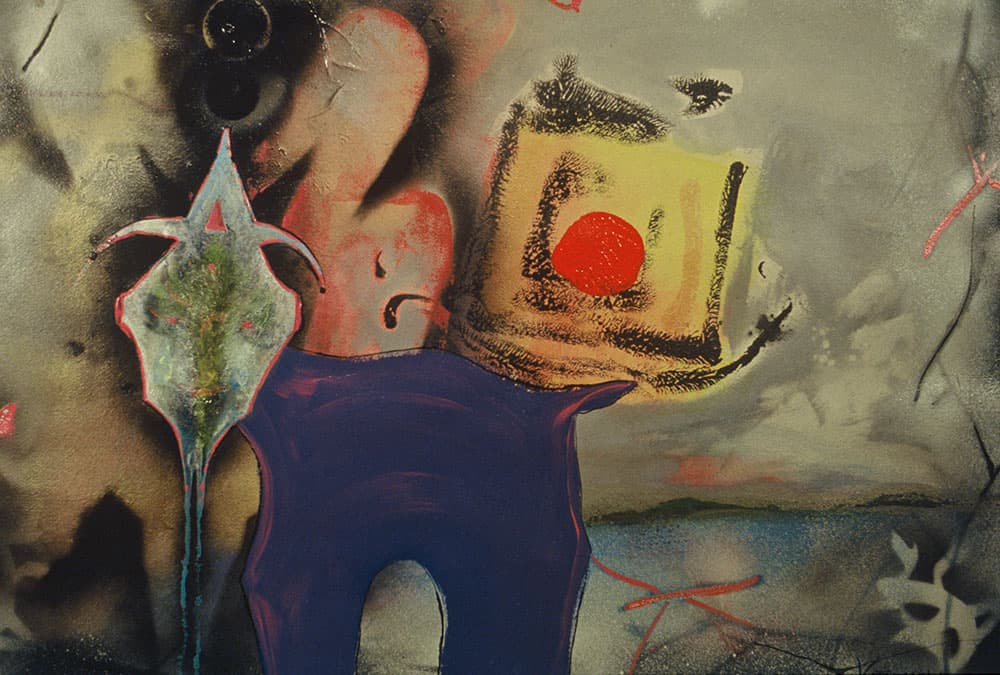
MM: What is most important to you in Biota’s music?
G: I guess the most important thing is that I find a tremendous amount of humanity in Biota’s work and working process. We collect our inspiration not only from the senses we experience as musicians, but through such creative realms as the artistry of films and visual arts – i.e., the best film directors, and the observations of life they’ve made – and, of course, from nature itself. It has fueled our own imaginations. We’ve found inspiration from the works of legendary painters, photographers, and countless great musicians and composers we’ve enjoyed. When these experiences are shared through the prism of familiar collaboration, it’s a life-affirming experience that I’ve really relied upon for my own sense of self and well-being.
MM: In 2019, you released your next album “Fragment for Balance”. Can you tell about the one?
G: I believe Fragment for Balance can be viewed as the apex of the evolutionary path we’ve been on since the 1980s. Many new perspectives and sensitivities had come into view by this time, and we had gained a greater and greater appreciation of the “understated” that we started to imbue our work with starting in the early 2000s – the kind of purposeful, understated beauty that characterizes much of this album. It is a philosophy that is very powerful in its way, and we certainly wanted to accentuate this mindset. In fact, it’s kind of a reflection of who we really are today.
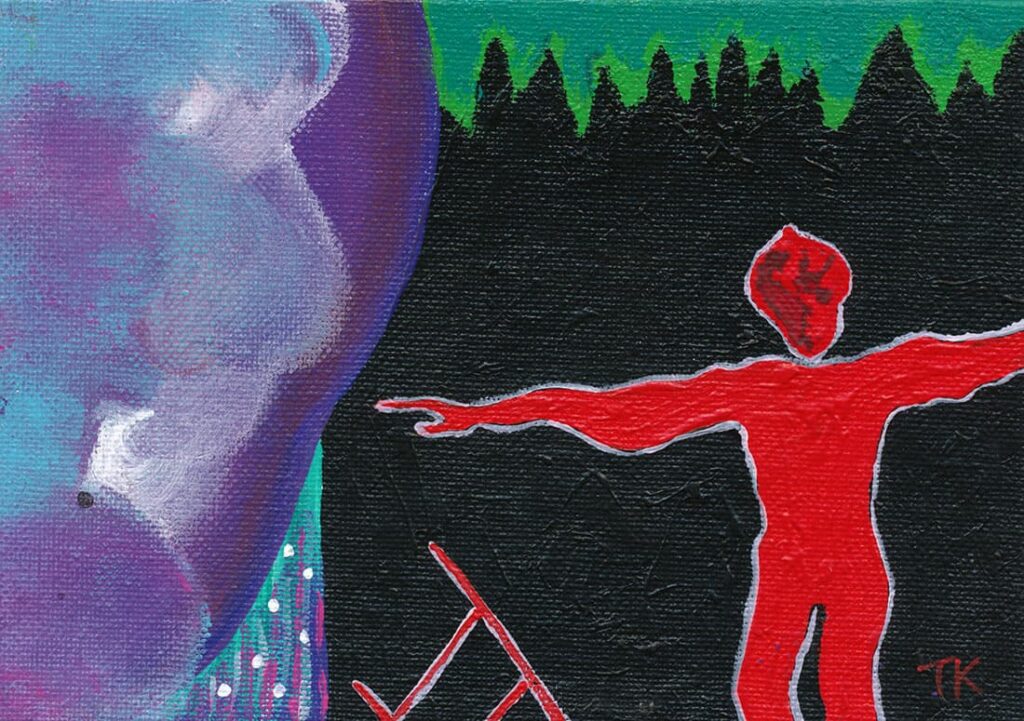
MM: Do you plan any more recordings?
G: I certainly hope so. It would be hard for me to imagine a life without Biota. Yet, personal circumstances and life events have temporarily interrupted that ongoing flow. The good news is that we are all still in touch and excited about the future.
MM: Now let’s talk about Sorry for Laughing. When was this project created?
G: That’s an interesting story. Sorry For Laughing actually started in the winter months of 1985-1986. It was my own invention, that of an excitable mid-20s-something musician/non-musician who wanted to embark on his own recordings, even though I had started working with Biota by then. Bill Sharp was kind enough to offer his time to record some instrumental songs I had crafted on piano and guitar, and I asked some of the other Biota folks to join in, which they were gracious to do. But it was clear from the start this was going to be a distinctly different project from Biota. We recorded these songs in Denver and Fort Collins, Colorado, ending in a small handmade tape edition that was circulated mostly among friends. The backdrop was Christmas time in Colorado, so there was a kind of optimistic Christmas sensitivity fueling that music, yet not all joyful.
MM: The first album “Jesus wept” was released in 1986. It was later reissued in 2019 by Klanggalerie as “Sorry For Laughing”. This material is very different from what the band currently presents.
G: Jesus Wept was to be the title of the tape that went out to friends in 1986. I didn’t even expect it to be listened to much by the people who received copies, other than perhaps a polite listen — but people began to tell me later how well they liked the material. So, a few years later, I had the idea of trying to gain a broader release, but this didn’t amount to much, and I moved on. However, some copies were evidently floating around as a result of that effort, and it all started to become a side note of the Biota story that some were aware of, including Walter Robotka in Vienna, who asked about remastering/reissuing it on CD for his Klanggalerie label—only 33 years after it was first heard by a handful of people! Life is strange, and I was happy to see it back in the world. For the CD reissue, I decided to drop the original title and simply release it eponymously.
MM: Next, two albums, “See It Alone” and “Remember, You Are An Actor” were released in 2021 and 2022. What was the reason for such a long break?
G: Fast forward to now. There was a lengthy pause that followed the last Biota release; and subsequent to the 2019 reissue of the Sorry For Laughing cassette onto CD, I began to think it might be worthwhile to bring back the Sorry For Laughing project, even after so many years. I had a number of uncompleted compositions, mostly for Hammond organ, that I was interested in exploring further. I shared these with Walter at Klanggalerie and he put me in touch with Edward Ka-Spel, an artist whose solo and group work I had admired for almost as long as I had been with Biota. Together, Edward and I started to look at those organ charts, and from there the wheels were basically set in motion to revive SFL.
MM: The aforementioned albums feature, among others, Edward Ka Spel (Legendary Pink Dots, Tear Garden), Martyn Bates (Eyeless In Gaza, Twelve Thousand Days), Patrick Q-Wright (Officer!), Janet Feder, Tom Katsimpalis (Biota), Kuwayama Kiyoharu. So can Sorry For Laughing be treated as a supergroup now or is it a rather fluid line up?
G: It’s a privilege to be able to work with the artists you’ve mentioned in this “new” Sorry For Laughing. Deciding to revive it at the height of the pandemic meant figuring out ways to collaborate and trade ideas with new players from afar, as most of us reside in other parts of the world. Yet, with enthusiasm, we overcame any geographic obstacles, and I’m now quite sure we’ve found a way to make this a lasting collaboration. We’ve all brought a lot to the table to make that happen, creating an identity and “a sound” all our own. But depending on schedules and projects, I suppose we will need to be a little flexible going forward, which could mean new faces now and then. (On the topic of fluidity and room to grow, our last album – Remember, You Are An Actor – introduced us to hurdy-gurdy virtuoso Steve Tyler, a wonderful musician whose sound and contribution has been a gift. I hope he’ll be back!)
MM: Talking about the music of Sorry for Laughing, it has something of painting for me. It is quite minimalistic, and at the same time rich in sounds. Actually full of little details that are also important.
G: As a producer, these are the things I value. The listener experience is so important, I feel. I love for listeners to have personal epiphanies each time they listen, such that it becomes a sensory activity that is not just restricted to the ears. The little details, as you say, are not always immediately evident, but would be missed if they were not there. But it’s the beauty of the music that is paramount—and that may sometimes mean it’s a little unsettling, too. I hope the arrangements take people somewhere.
MM: I know categorizing and labeling music is not that important, but where would you put and name Sorry For Laughing?
G: It’s a tough one, because I’m sure neither you nor I would want to pigeonhole the music too inflexibly. But in a way, I think of this as a kind of chamber music, with some familiar modern classical elements sharing space with folk sentiments and, of course, our intrinsic love of rock and progressive experimentalism. There is also drama in the arrangements.
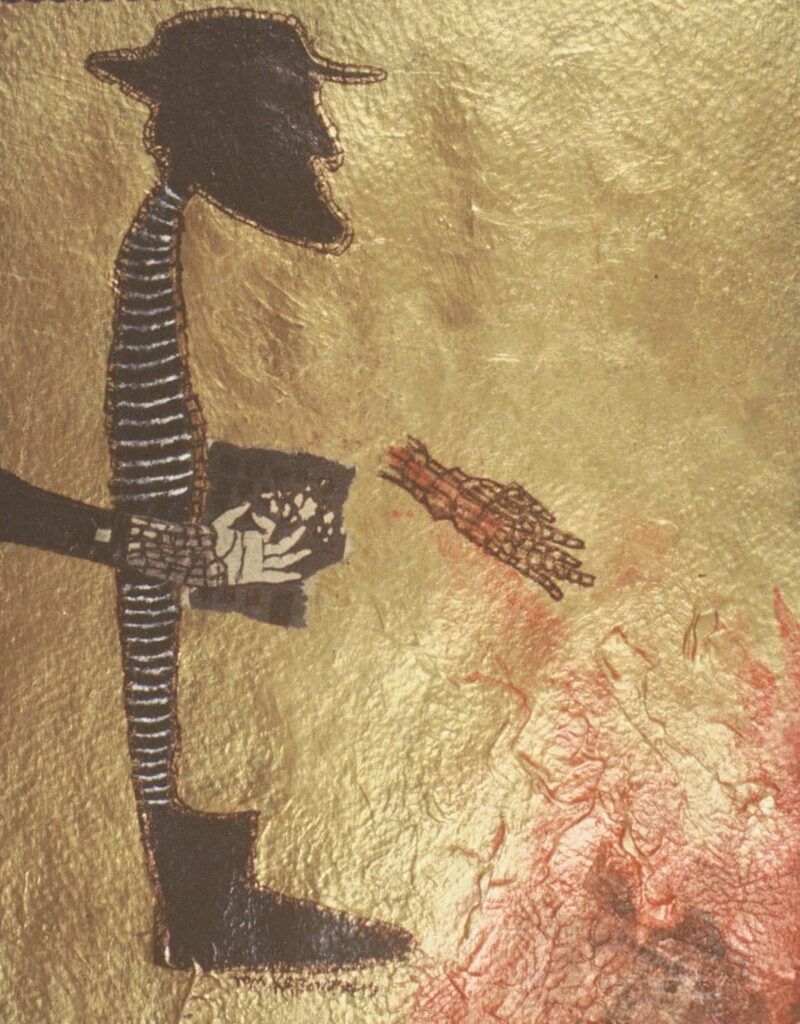
MM: I must also admit that the vocals and lyrics of Martyn Bates and Edward Ka Spel are the perfect combination with sounds. They harmonize beautifully with Sorry for Laughing music. I understand that they easily agreed to your proposal to participate in your project?
G: I completely agree. These are two gifted vocalists. It’s probably the greatest reward I’ve had from the Sorry For Laughing “resurrection”: experiencing these two great artists sing so beautifully to music I started. I’m always happy when I provide a welcoming backdrop for Martyn’s and Edward’s interpretations and lyrics. All of the SFL musicians (Martyn, Edward, Patrick, Janet, Steve…) are great to work with and have helped forge fantastic arrangements with impeccable playing and sensitivity, each bringing important ideas. The songs truly end up as co-compositions. Many of us have shared a familiarity and admiration of each other’s works through the years, so I guess it seemed like such a natural thing to agree to try to work together. We’ve chanced upon a good chemistry.
MM: Looking at the Sorry for Laughing covers and inserts, I have the impression that you attach great importance to the graphic design of your releases. These images, graphics, photos correspond perfectly with the music.
G: Oh yes. This is where the Biota-Mnemonists tradition comes in. As owners of Biota albums know, the visual art element is of equal gravity to the musical element. They work together. That tradition carries over with Sorry For Laughing. For the albums you mentioned earlier (See It Alone and Remember, You Are An Actor), we enlisted a wonderful U.S.-based designer named Tim Schwartz to help us blend the visual elements into such beautiful presentations. It has been my great fortune in life to be connected to some incredible visual artists, including those in Biota-Mnemonists. The iconoclastic art of Tom Katsimpalis and the biotic photography of Bill Sharp grace the Sorry For Laughing album covers and inserts as well. It’s a touchstone for me.
MM: Are you planning any concerts with Sorry for Laughing at all?
G: I would really love to arrange that at some point. I feel it’s something we must do. A little difficult to plan as we’re not exactly in the same communities, but I have wondered about the possibility of a small European or UK tour, where many of our members live. The Klanggalerie label hosts an annual live music festival in Vienna, and whereas it may be a little late for this year, perhaps we can participate in 2024. It would be very exciting.
MM: What are you currently working on? I hope you will surprise us soon with more albums from Sorry for Laughing or maybe something else?
G: I can definitely say Sorry For Laughing will be active in 2023! Martyn Bates and I have been in collaboration throughout the last year, and the pipeline is filling up with wonderful new songs. In fact, I’m aiming at a new SFL album perhaps by summer, and there is enough new material to take us beyond.
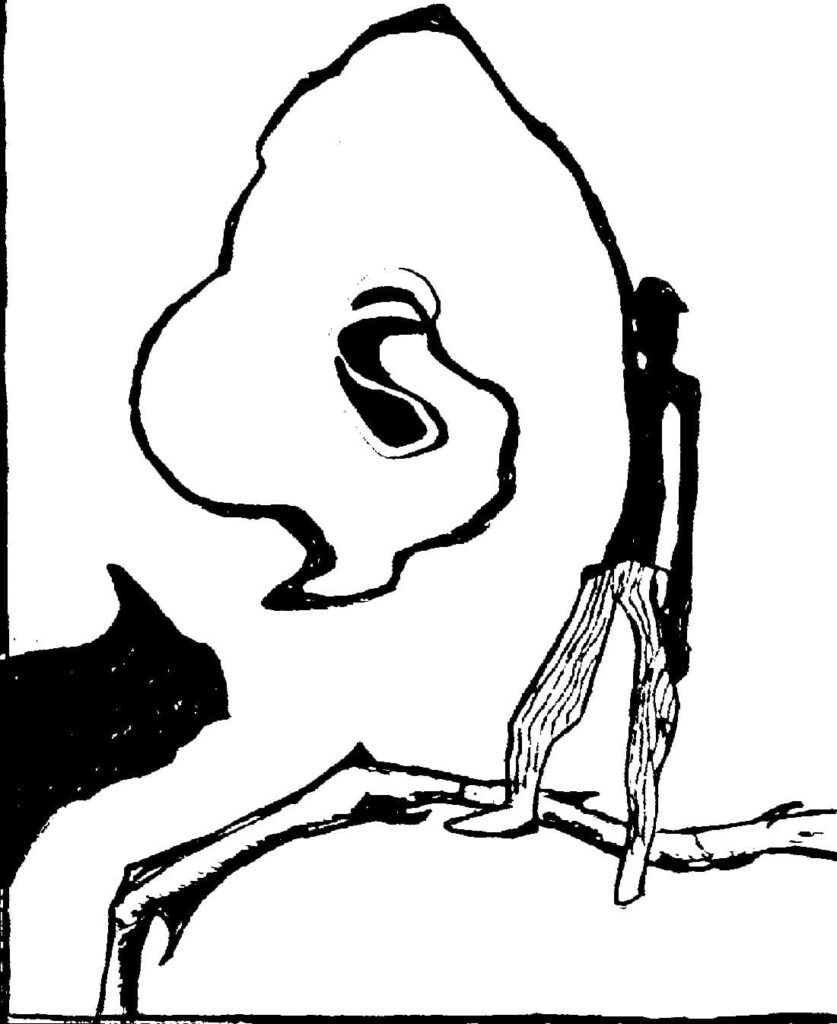
MM: I think that the last album Sorry for Laughing is one of the most interesting albums of 2022. Can you name your favorite albums from that year, what did you listen to most often?
G: I found my ability to listen to new music in ’22 was impacted by the amount of time I spent in the studio, working with Sennheisers on, scrutinizing Sorry For Laughing mixes. Frankly, it’s where I wanted to be. Still, I am an avid listener and collector too, and the following have been known to be in “heavy rotation” recently on my sound system – folk (Martin Carthy, John Kirkpatrick, Maria Kalaniemi, Blowzabella, etc.); progressive jazz-rock (Soft Machine, Camel, Cluster, Chris Squire, etc.); songwriters (Kevin Ayers, Phil Ochs, Townes Van Zandt, Sandy Denny, etc.); and 20th-century composers (Arne Nordheim, Morton Feldman, Terry Riley, Olivier Messiaen – especially his organ works). And I will say I’ve thoroughly enjoyed albums and tracks by my SFL colleagues that have appeared in ’22… some really amazing stuff worth hearing!!